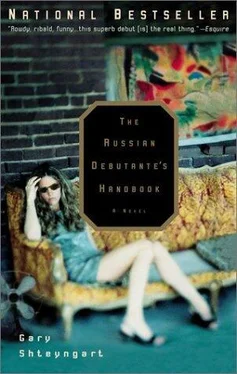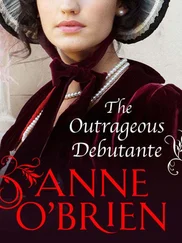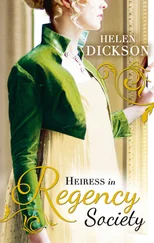Gary Shteyngart - The Russian Debutante's Handbook
Здесь есть возможность читать онлайн «Gary Shteyngart - The Russian Debutante's Handbook» весь текст электронной книги совершенно бесплатно (целиком полную версию без сокращений). В некоторых случаях можно слушать аудио, скачать через торрент в формате fb2 и присутствует краткое содержание. Город: New York, Год выпуска: 2003, ISBN: 2003, Издательство: Riverhead Books, Жанр: Современная проза, Юмористическая проза, на английском языке. Описание произведения, (предисловие) а так же отзывы посетителей доступны на портале библиотеки ЛибКат.
- Название:The Russian Debutante's Handbook
- Автор:
- Издательство:Riverhead Books
- Жанр:
- Год:2003
- Город:New York
- ISBN:0-7865-4177-6
- Рейтинг книги:4 / 5. Голосов: 1
-
Избранное:Добавить в избранное
- Отзывы:
-
Ваша оценка:
- 80
- 1
- 2
- 3
- 4
- 5
The Russian Debutante's Handbook: краткое содержание, описание и аннотация
Предлагаем к чтению аннотацию, описание, краткое содержание или предисловие (зависит от того, что написал сам автор книги «The Russian Debutante's Handbook»). Если вы не нашли необходимую информацию о книге — напишите в комментариях, мы постараемся отыскать её.
and
. The Russian Debutante’s Handbook Bursting with wit, humor, and rare insight,
is both a highly imaginative romp and a serious exploration of what it means to be an immigrant in America.
The Russian Debutante's Handbook — читать онлайн бесплатно полную книгу (весь текст) целиком
Ниже представлен текст книги, разбитый по страницам. Система сохранения места последней прочитанной страницы, позволяет с удобством читать онлайн бесплатно книгу «The Russian Debutante's Handbook», без необходимости каждый раз заново искать на чём Вы остановились. Поставьте закладку, и сможете в любой момент перейти на страницу, на которой закончили чтение.
Интервал:
Закладка:
Mr. Rybakov opened his eyes and turned to Vladimir, who was nervously fingering his balding temples.
“So,” Rybakov said, “now that the Fan is silent, there’s time for us to think the story over. How do we feel about this interesting tale? Are we outraged, in a kind of American way, about the activities of the son? Are we worried about the prostitution and the contraband and the diners blowing up—”
“Well,” Vladimir said. “The story does raise some issues.” The Rule of Law, that bedrock of Western democracy—that was one issue. “But we do have to remember,” Vladimir said, “that we are poor Russians, that we live in difficult times for our homeland, and that we often have to take special measures to feed our families, to survive.”
“Yes! An excellent answer!” said the Fan Man. “You’re still a russki muzhik, not like some of these assimilationist children with their law degrees. The Fan is pleased. Now, Vladimir, I must make a clean breast of it—I baited you up here for more than just herring and vodka and the reminiscences of a tired old man.
“This morning, the Fan and I had a conference call with my son, the Groundhog, in Prava. He, too, is a big fan of your mother. He knows that the son of Yelena Petrovna Girshkin will not disappoint us. Oh, Vladimir, stop with your modesty! I won’t hear of it! ‘I’m not my mama’s son!’ he cries. ‘I’m a simple man!’ You’re a little cucumber, that’s what you are…
“Well, cucumber, the Fan and I are pleased to offer you the following proposition: Get me my citizenship, and my son will make you an associate director in his organization. The minute I’m naturalized you’ll have a first-class ticket to Prava. He’ll turn you into a schemer of the first rank. A modern businessman. A… how do you Jews say it…? A gonif. Job pays more than eight dollars an hour, that’s for certain. Requires knowledge of English and Russian. Candidate should be Soviet and American all at once. Interested?”
Vladimir crossed his legs and brought himself forward; he hugged himself in this position and shuddered a little. But all this physical melodrama was ridiculous. From a logistical standpoint, there was simply nothing there. He was not going to become a mafioso in Eastern Europe. He was the coddled single child of Westchester parents who had once paid twenty-five thousand dollars a year to send him to a progressive Midwestern college. True, Vladimir was not known to traverse a well-defined moral landscape, but trafficking arms to Iran was definitely off his map.
And yet, in the very back of his mind, a window opened and Mother leaned out shouting for all to hear: “Soon my Little Failure will be a Big Success!”
Vladimir shut that window with a bang. “There’s really no need for this, Mr. Rybakov,” he said. “I will refer your case to my agency’s lawyer. He will help you fill out the Freedom of Information Act form. We will find out why your citizenship application was denied.”
“Yes, yes. My son and the Fan are of a like mind on this issue as well: You are a Jew, and a Jew isn’t stupid; you have to give him something to make it worth his while. I’m sure you’re familiar with the old Russian proverb: If there’s no water in the sink, then the Yids have had their drink…”
“But Mr. Rybakov—”
“Now, listen to me, Girshkin! Citizenship is everything! A man who doesn’t belong to a country is not a man. He is a tramp. And I am too old to be a tramp.” There was a moment of silence save for the smacking sounds the old sailor made with his fleshy lips. “Would you be so kind,” he whispered, “as to set the Fan to high. He wants to sing a song in celebration of our new understanding.”
“Just press the HIGH button?” Vladimir asked, his stomach sounding the requisite music of nervousness. What new understanding? “My mother says first you must set a fan to medium and then after a while set it to high, because otherwise the motor—”
Mr. Rybakov raised his hand to cut him off. “Service the Fan as you will,” he said. “You’re a good young man and I trust you with him.”
Vladimir felt the heaviness of the word “trust” in Russian, a favorite in the Girshkin household. He rose without ceremony and went over to the fan, pressing the button marked MEDIUM. The apartment was centrally air-conditioned but the new breeze, a fist of cool air punching through the general coldness, was welcome. He hit the button marked HIGH and the blades visibly doubled their effort, their buzz now punctuated by internal creaks and pops.
“I ought to grease him again,” whispered Rybakov. “You can hardly hear him with all that creaking.”
Vladimir stumbled for a response, but came out with a sort of mooing sound.
“Shh, listen,” said his host. “Listen to the song. Do you know this song?” The Fan Man let out a series of raspy creaks himself, and then Vladimir realized that he was singing along:
“Ta-pa-pa-ra-ra-ra-ra Moscow nights.
“Pa-ra-ra-ra-ra-pa-ra-ra
“I won’t forget you
“Pa-ra-ra-ra-ra Moscow nights.”
“Yes, I know that song!” Vladimir said. “Ta-pa-pa-ra-ra Moscow nights…”
They sang the verse several times, occasionally substituting remembered words for the “pa-ra-ra.” Perhaps it was his imagination, but Vladimir could hear the fan keeping tempo with them, if not actually prodding them into the bittersweet ditty.
“Give me your hand,” said Mr. Rybakov, opening a creased, vein-ridden palm on the table. “Just put your hand there,” he said.
Vladimir looked at his own hand carefully as if he was about to place it inside the fan’s grating. Such slender fingers… They said slender fingers would be good for piano, but you had to start early for that. Mozart was—
He placed his hand into the warmth of the Fan Man’s palm and felt it close around him like a python over a rabbit. “The Fan is spinning,” said Mr. Rybakov and squeezed hard.
Vladimir looked at the spinning fan and thought of his parents and their upcoming weekend barbecue. “Pa-ra-ra-ra-ra Moscow nights.” They sang it in Brighton Beach and they sang it in Rego Park, and they sang it on WEVD, New York—“We Speak Your Language”—that the Girshkins had always left the radio tuned to, even when his first American friends from Hebrew school came over to play computer games and they heard the “Pa-ra-ra-ra…” and the two-dollar synthesizer orchestra in the background, and saw his parents at the kitchen table singing along while munching on the verboten pork cutlets, slurping down the mushroom-and-barley soup.
Mr. Rybakov released Vladimir’s hand and patted it casually, as one pets a favored dog after it returns with the morning papers. He slumped over the side of his recliner. “Be so kind as to get the bedpan from my bedroom,” he said.
4. WOMEN AND THE VLADIMIR QUESTION
SEVERAL HERRINGS LATER, Vladimir bid his client farewell and returned to his humble Alphabet City lodgings. He was due to celebrate his birthday with “little Challah-bread,” his lover. But as fate had provided, on this particular day Challah was summoned to the Dungeon, the Chelsea whipping cavern. Four Swiss bankers, recent transplants to New York, had found that in addition to their jobs restructuring Third World debt, they had in common the need to be humiliated by a mother figure, someone a little more substantial than the Dungeon’s standard fare. And so Challah’s beeper had registered the code $$URGENT$$. Off she went with a little metal box full of dick rings and nipple clamps, to be back by nine, she promised, which left Vladimir with some time alone.
First he took a long cold shower. It was ninety degrees outside that day; inside, a good hundred. Then, naked and washed, he happily roamed around the two-and-a-half rooms of their railroad flat, traversing the narrow path where his urbane belongings and Challah’s junk had once gone to war, and were now separated by an unofficial Green Line.
Читать дальшеИнтервал:
Закладка:
Похожие книги на «The Russian Debutante's Handbook»
Представляем Вашему вниманию похожие книги на «The Russian Debutante's Handbook» списком для выбора. Мы отобрали схожую по названию и смыслу литературу в надежде предоставить читателям больше вариантов отыскать новые, интересные, ещё непрочитанные произведения.
Обсуждение, отзывы о книге «The Russian Debutante's Handbook» и просто собственные мнения читателей. Оставьте ваши комментарии, напишите, что Вы думаете о произведении, его смысле или главных героях. Укажите что конкретно понравилось, а что нет, и почему Вы так считаете.












